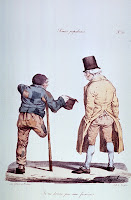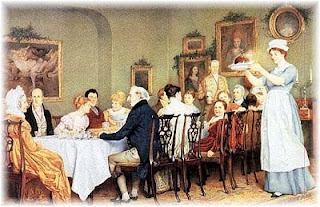The Arts Journal website (thanks, JA for this resource) led me to an article on Big Questions Online: A Not-So-Distant Mirror by Alan Jacobs, a professor of English at Wheaton College, who writes the Text Patterns blog.
 The article is about how the 18th Century is similar to the 21st. His article is based on a social history of Georgian England, English Society in the Eighteenth Century by Roy Porter.
The article is about how the 18th Century is similar to the 21st. His article is based on a social history of Georgian England, English Society in the Eighteenth Century by Roy Porter.
Because people often lump the Regency into issues relevant to the late Eighteenth Century, I thought this article was relevant to “our” time period. But, I warn you, my “social worker” self will be peeking out here.
Here are some of Jacobs’ (and Porters’) points:
1. The English in the 18th century were developing a social conscience, showing more concern for the poor and for children than their ancestors. Certainly through our modern times, we’ve developed more services for the poor–welfare, food stamps, unemployment, disability, etc. We’ve shown concern for children–education, head start, WIC, Child Protective Services, Foster Care, etc.
Of course, Jacobs quotes Porter as saying, “Tears for the exploited, the unfortunate and the afflicted flowed freely, but sympathy cost little, and was only occasionally translated into action.” I suppose we could make a case for this in our present society, too.
 2. Child rearing practices were changing. Porter says, “Many ladies abandoned the wet nurse and experimented with breast-feeding; swaddling disappeared, partly in response to mothers’ new-found desire to fondle, dandle and dress their infants.” Our Regency mothers are more apt to breast feed than their mothers. From, say, the 1950s, when formula and scheduled bottle feeding was the norm, in more recent times mothers have turned back to breast feeding. Jacobs also notes that 18th century parents were more apt to turn away from physical punishment and to rely on “reasoning, coaxing and kindness” in disciplining their children. We in modern times have also turned away from physical punishment, relying on “consequences” and “time out.” Jacobs also notes that 18th century parents could tend to be over-protective and we can certainly relate that to parenting today where parents are involved in every aspects of their children’s lives.
2. Child rearing practices were changing. Porter says, “Many ladies abandoned the wet nurse and experimented with breast-feeding; swaddling disappeared, partly in response to mothers’ new-found desire to fondle, dandle and dress their infants.” Our Regency mothers are more apt to breast feed than their mothers. From, say, the 1950s, when formula and scheduled bottle feeding was the norm, in more recent times mothers have turned back to breast feeding. Jacobs also notes that 18th century parents were more apt to turn away from physical punishment and to rely on “reasoning, coaxing and kindness” in disciplining their children. We in modern times have also turned away from physical punishment, relying on “consequences” and “time out.” Jacobs also notes that 18th century parents could tend to be over-protective and we can certainly relate that to parenting today where parents are involved in every aspects of their children’s lives.
3. Jacobs notes that ethical norms were loosening in the 18th century, much like today, and were more apt to be based on an individual’s own psychological make-up and what feels right and good to the individual. An 18th century version of the Me Generation!
I thought of other parallels, more attuned to the Regency, like, maybe:
 1. An economic downturn and high unemployment? Certainly that was the experience in the Great Britain after the Napoleonic Wars. The populace complained about what the Parliament enacted to try to solve the problems (which did protect the wealthy landowners who tended to be themselves)
1. An economic downturn and high unemployment? Certainly that was the experience in the Great Britain after the Napoleonic Wars. The populace complained about what the Parliament enacted to try to solve the problems (which did protect the wealthy landowners who tended to be themselves)
2. More relaxed fashions? Enter in the era of grecian fashions, empire waists for women, and elimination of brocades, lace, and a rainbow of colors for men. No more powdered hair or wigs. Of course, we have turned even more casual than the Regency. Remember when we used to dress up to ride in airplanes?
3. A long war? The Napoleonic Wars lasted from 1803 to 1815.
Can you think of any other social or political parallels between today and the Regency?
 Don’t forget to enter the Harlequin Historical Holiday Contest. Prizes are awarded every day and the Grand Prize is a Kindle. Go here for more information. This Thurday is my day! Come to Diane’s Blog on Thursday for a chance to win your choice of a signed copy of one of my backlist books and a $10 Amazon gift certificate.
Don’t forget to enter the Harlequin Historical Holiday Contest. Prizes are awarded every day and the Grand Prize is a Kindle. Go here for more information. This Thurday is my day! Come to Diane’s Blog on Thursday for a chance to win your choice of a signed copy of one of my backlist books and a $10 Amazon gift certificate.








